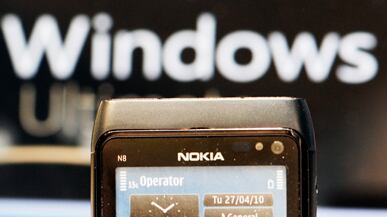For years Nokia has been the world’s leading maker of mobile phones. But the Finnish company struck a deal this month that will doom it to the dustbin of history. On that day it announced it will no longer develop its own mobile-phone-software platform, called Symbian, but will license Microsoft’s Windows Phone operating platform.
That’s a huge win. Not for Nokia, but for Apple and Google. Those companies have seized onto mobile computing, correctly perceiving that it’s the future of the industry and will probably be bigger than the personal-computer revolution.

But making a deal with Microsoft means that Nokia, which has been losing market share for years because of its outdated operating software, will go into an even steeper slide. Apple’s iPhone and Google’s Android platforms will be able to scoop up even more of Nokia’s customer base, which they’ve already been eroding.
As Google executive Vic Gundotra wrote on Twitter just before the Microsoft-Nokia pact was announced: “Two turkeys do not make an eagle.”
Some of that comment might be chalked up to sour grapes. Google tried and failed to win Nokia’s business. But there’s truth in what Gundotra says. Windows Phone 7, which shipped last year, simply cannot compete with the smartphone platforms from Apple and Google. Microsoft’s offering came to market late and still lacks features found in the other systems, like visual voice mail and the ability to copy and paste text.
The shortcomings of Windows Phone 7 are reflected in the market’s tepid response. In the fourth quarter of last year only 1.5 million Windows Phone 7 units were shipped, vs. 16.2 million from Apple, according to market researcher IDC. Nokia, meanwhile, remained the biggest smartphone vendor as of the end of 2010. But in the course of the year its market share dropped from 39 percent to 33 percent. The biggest gainers were Samsung, whose market share grew from 3.2 percent to 7.6 percent, and HTC, which grew from 4.7 percent to 7.1 percent, says IDC. Those gains were due entirely to their early embrace of Android, which is far and away the fastest-growing mobile platform.
Microsoft won the competition by offering billions of dollars to Nokia. But in exchange for that shot of cash, Nokia has sold its soul and destroyed its future.
Still, it was perhaps no surprise that Nokia chose to go with Microsoft. Stephen Elop, Nokia’s current CEO, is a former top Microsoft executive. And Elop has revealed that Microsoft won the competition by offering billions of dollars to Nokia. But in exchange for that shot of cash, Nokia has sold its soul and destroyed its future.
I doubt that these two clumsy, lumbering companies can work together in any meaningful way. Neither has been able to bring products to market swiftly on its own. Why would we expect them to do so together? Worse yet for Nokia is that Microsoft doesn’t allow hardware licensees to customize Windows Phone 7 code to do things like create their own user interfaces. Google, in contrast, ships Android as a completely open-source program, meaning hardware companies are free to do whatever they like with the code—change it, customize it, optimize it for their hardware.
To be sure, that freedom leads to some chaos, as no two Android phones are exactly alike. But it doesn’t seem to be holding Android back. In the fourth quarter of 2010, Android phones (in aggregate) outsold every other platform, including Nokia’s Symbian, according to market researcher Canalys.
Microsoft and Nokia are both already years behind Google and Apple. Now these slow boats are yoking themselves together and expecting that somehow they’ll go faster. Five years from now—perhaps much sooner—they will cease to matter at all in the mobile market.
Dan Lyons is technology editor at Newsweek and the creator of Fake Steve Jobs, the persona behind the notorious tech blog, The Secret Diary of Steve Jobs. Before joining Newsweek, Lyons spent 10 years at Forbes.






